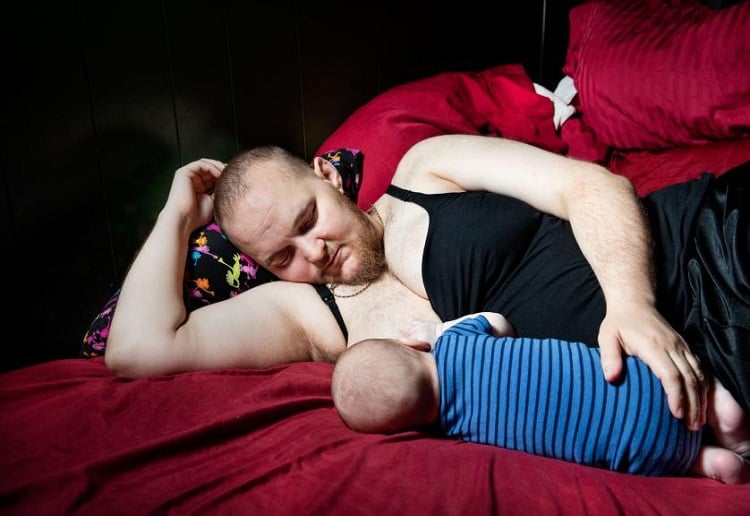Evan was born female. He came out as transgender 16 years ago but never stopped wanting to have a baby.
Jessi Hempel writes for Time, that her brother Evan was 35 when the desire to have a baby grew stronger.
He had wanted to be a parent since he was very young. He’d helped pay for college by nannying triplets. And when he first came out to friends as transgender at 19, changing his name and beginning his long physical transformation, he didn’t stop adding to the list of baby names in the back of his journal.
In 2003 he first started taking hormones to become a man.
He started binding his chest with a thick bandage wrap. His hair began to thin. His hips disappeared and were replaced by thick muscles around his chest. But mostly, Jessi explains, I remember his hands. “We both have the same small hands, the same indelicate, stubby fingers. I watched the hair grow thick over his knuckles, which were my knuckles.”
Before his pregnancy, he injected hormones into his thigh once weekly to lower his estrogen while boosting his testosterone.
He elected not to have top surgery, the double mastectomy that many trans men undergo, because he is allergic to most antibiotics. Also, he knew he might one day want to nurse a baby.
He wore two compression-tank binds made by a company called Underworks beneath his shirt. “It hurts, but I’ve gotten used to it,” he said. “I imagine it’s like some women getting used to high heels.”
In 2013, when Evan made an appointment with his primary-care physician at the Boston LGBT health center Fenway Health to talk about having a baby, he was the first prospective birth father his doctor had seen.
Evan has a female partner, so he inseminated using donor sperm. It took a while. The first time Evan tried, five years ago, he was unsuccessful. He took a break before starting again three years ago. He stopped his T shots, his Dr Kowalik prescribed two medications to trigger ovulation and monitored Evan’s body throughout the process to get the timing right.
Evan estimates that the entire process, including medication, doctor visits, co-pays and ultrasounds, cost him close to $12,000 over the course of several years
Evan was pregnant. He knew he should feel excited when his doctor rang to tell him the good news. But instead, he felt a chill of anxiety and anticipation. He’d wanted this for so long. Just four months earlier, he’d miscarried after Dr Kowalik told him she couldn’t find a heartbeat during his first ultrasound.
Dr Kowalik told him he had low levels of progesterone, a hormone that helps maintain a healthy pregnancy, and prescribed some pills for him to start taking right away. “Congratulations,” she said after a pause. “This is a good start.”
When his health insurance refused to cover his pregnancy test because he was male, he spent several hours explaining his situation to a representative, waiting on hold and explaining it again. “My sex is female, and my gender is male,” he told the rep.
The baby arrived on the day he was expected. “I’m not sure he’s mine,” Evan texted Jessi. “I’ve never been on time to anything in my entire life.”
Six days later, Jessi drove to Boston to meet the baby. When she arrived, Evan had just finished chest-feeding. He answered the door in pajama bottoms and a nursing tank, with the baby swaddled in the crook of his right elbow. Jessi shares, “Evan handed my nephew to me, and right away, the baby began squalling, his mouth gnawing at my arm. I handed him back to my brother, who gestured for all of us to sit at the big wooden kitchen table and then started chest-feeding again.”
Jessi asked Evan if childbirth had changed how he thought about his gender. Wasn’t there some part of him that questioned his masculinity? “You know, people who are not trans talk about being ‘trapped in a body.’ But that’s not really the way my friends talk about it,” he said. “I was always Evan. I always had these parts. I always just felt like me, and like I was a guy.”
Evan belongs to a private Facebook group called Birthing and Breast or Chestfeeding Trans People and Allies. A list of guidelines spells out who can join the group: “People on the transfeminine spectrum, those who are genderfluid, nongender folks, transmasculine individuals, and cisgender allies.”
He turns to this group when he has questions about chest-feeding, the term trans men have adopted for nursing–or choosing a trans-friendly pediatrician.
Evan will continue to chest-feed for a while. Eventually, he’ll begin taking testosterone again. His beard will fill out, and the fuzz will return to his knuckles. His chest will shrink to the point where his bind will be comfortable to wear again. To outsiders, his family will look like any other.
Share your comments below.




















-

-
-
taynik46 said
- 04 Sep 2016
-

-
-
mum4107 said
- 04 Sep 2016
-

-
-
nealsq said
- 03 Sep 2016
-

-
-
meedee said
- 03 Sep 2016
-

-
-
mom160421 said
- 03 Sep 2016
-

-
-
Jodilb said
- 03 Sep 2016
-

-
-
mom64356 said
- 02 Sep 2016
-

-
-
tania_hardman said
- 02 Sep 2016
Post a comment9:46 am
5:50 am
8:34 pm
7:17 pm
1:50 pm
10:41 am
9:38 pm
8:56 pm
To post a review/comment please join us or login so we can allocate your points.